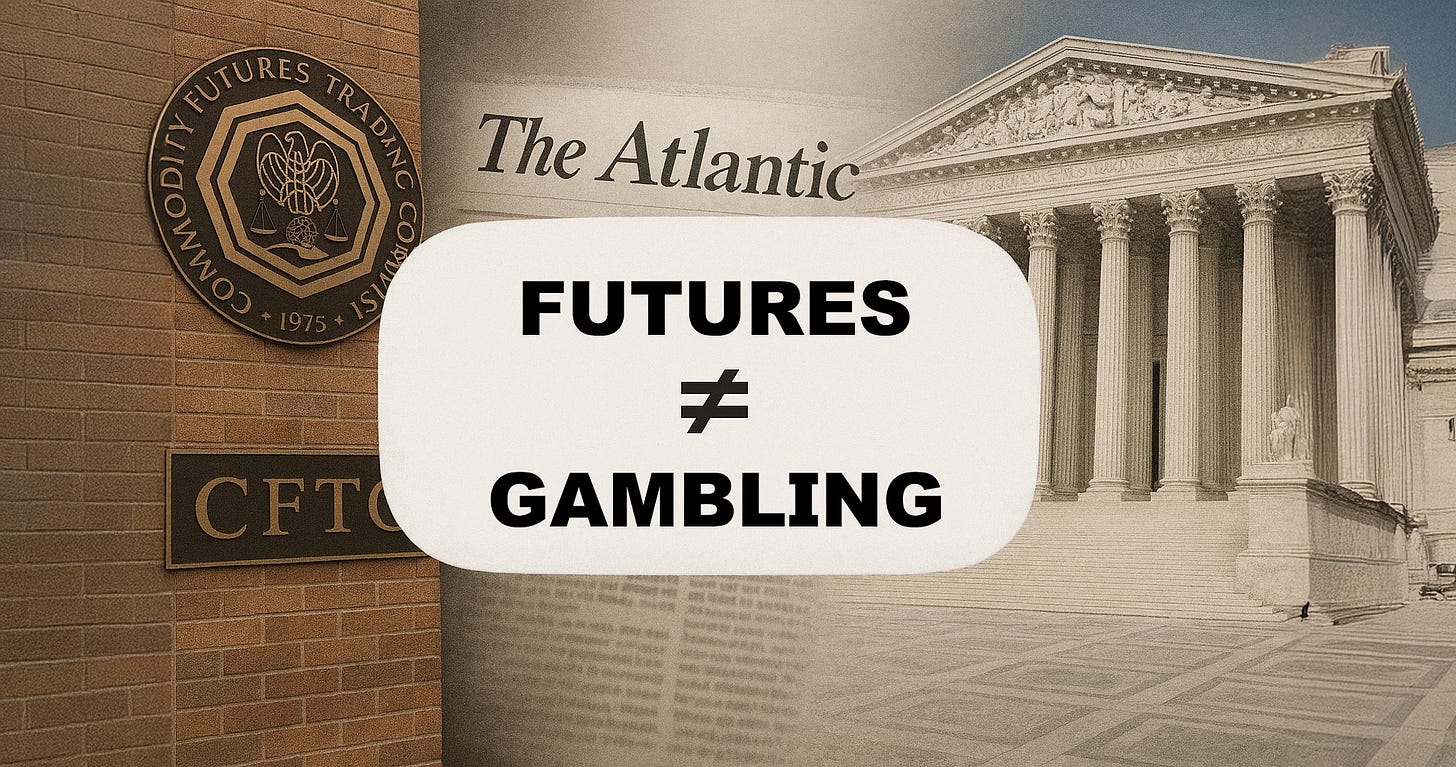Futures Markets Deserve Better Press
The Atlantic’s take on Kalshi misfires on law, logic and market structure
When Journalism Misses the Mark
Long-form pieces on prediction markets are becoming a weekly occurrence now, which is a good thing. Attention on this topic is urgently needed. That said, when those pieces contain inaccuracies, misinformation or otherwise contribute to the confusion, that is not a good thing. Attention alone isn’t enough. If society can’t convert that attention into meaningful change, we’ll end up in an even worse spot than before.
Last week, we shed some light on the NYT piece titled Gambling. Investing. Gaming. There’s No Difference Anymore. Just as we were preparing to publish it, the Atlantic released their own take: The Company Making A Mockery of State Gambling Bans. So today, we will offer some commentary on that piece. Long story short: It’s more damaging than it is helpful.
The Confusion Starts Early
Title: The Company Making a Mockery of State Gambling Bans
Subtitle: Thanks to Kalshi, a so-called prediction market, sports betting is now legal everywhere—even where it isn’t.
From the outset, the author signals his stance–consciously or not, by making legal conclusions that are still being litigated, and likely will for some time, possibly all the way to the Supreme Court.
“Making a mockery of state gambling bans…” Implicit in that framing is the assumption that states have jurisdiction over sports gambling. That’s a jurisdictional question still very much unresolved.
On the legality of sports gambling, there are three competing views:
Sports gambling can be offered everywhere (the Atlantic’s position as well as Kalshi’s);
Sports gambling can only be offered in states where it is “legal” (states’ position); and
Sports gambling can not be offered anywhere. (Our position)
As extreme as our position may sound, distilling the preemption puzzle into three questions lands us precisely in that spot:
Is sports a commodity? (Yes)
Can the CFTC allow it? (No)
Is there room for states? (No)
The Confusion is Not Limited to Sports Markets
At some level, the speculator is gambling. “All you’re doing is betting on whether the price of grain will go up or down,” Karl Lockhart, a law professor who studies prediction markets, told me.
This quote reflects a fundamental misunderstanding of futures markets and it’s concerning that it comes from an academic with an article forthcoming in the Boston College Law Review titled “Betting on Everything.”
The distinction is subtle. Extremely so. The speculator in futures markets is speculating–not gambling. Why?
→ If a contract offers sufficient risk management or hedging utility, it’s not gambling. It can be listed and traded. Hedgers hedge their risk; speculators speculate, providing liquidity. Nobody is gambling.
→ If a contract lacks hedging utility and is dominated by speculators, it becomes a gambling contract–and isn’t supposed to be listed and traded at all. In that scenario, nobody would be gambling because the contract isn’t supposed to even exist.
Here’s the nuance: In games, the word gambling attaches to not just the game itself, but also to the players. And crucially, being deemed gambling doesn’t mean the game disappears. The entity offering the game still gets another bite at the apple–because states can choose to allow and regulate it.
Not so in futures markets. In futures markets, gambling attaches only to the contract. And if the contract is deemed gambling? That designation annihilates the contract’s very existence. There’s no concept of individuals gambling in futures markets, because there is no concept of regulating a futures product that is for entertainment only. If the contract is gambling, it’s not supposed to be accessible in the first place.
So, not all futures are gambling, only some are; and those are supposed to remain hidden behind the curtain.
You might ask: Aren’t people accessing sports bets offered by Kalshi? Aren’t they gambling?
Of course they are, and that’s precisely the point. For 175 years, the goal has been to build and maintain a derivatives industry distinct from gambling. That’s the CFTC’s longstanding position, and one we agree with. Why society and the financial markets find themselves at this juncture and also why we are heavily covering this topic, is a result of two connected developments:
The CFTC recently abandoned Congress’s mandate through their litigation stance in Kalshi v. CFTC, which cracked the door open for sports event markets; and
Kalshi is trying to capture the ultimate prize after walking right through that door.
At the heart of the sports gambling issue is the CFTC’s broad inaction on sports betting. We actually agree with Kalshi that this is an APA issue, not a state gambling law issue. We said as much in our amicus brief. But we disagree with Kalshi that they can happily coexist with the states. Why? Because if Kalshi can offer sports bets, the state-regulated sportsbooks can’t, and if Kalshi can’t, the state-regulated sportsbooks still can’t. The CFTC could have acted as early 2018 when states began moving to “legalize” sports gambling post-Murphy—this inaction has been years in the making.
Worth noting, we also disagree with Kalshi that sports event contracts are permissible under Dodd-Frank. They’re not permitted if the economic purpose is intact (we believe that to be the case)–and they’re still not permitted even if it isn’t. (Kalshi agreed with us on this point until recently).
Misunderstanding the Market’s Evolution
With the government’s blessing, the futures market continued to evolve. People began trading currency futures in the ’70s, betting on the fluctuations of the pound or the franc or the Mongolian tugrik. Soon after, markets were created allowing banks to buy and sell bets on future interest rates. The banks were hedging, much like the hypothetical Michigan farmer—if interest rates went up, they’d be hurt, so they would bet on interest rates going up, and then their losses wouldn’t be so big. Other financial firms would take the other side of the bet. Were they gambling? Maybe, but they were also helping banks stay solvent. (emphasis added)
Same confusion. If you’re trading currency futures, you’re either speculating or you’re hedging, but you’re not gambling.
Misrepresenting the Kalshi Case
The Biden-era CFTC decided Kalshi’s political expansion was prohibited because it involved “gaming and activity that is unlawful under state law” and was “contrary to the public interest.” Kalshi challenged the CFTC’s order in federal court. The judge ruled in Kalshi’s favor, reasoning that if betting on elections were to count as gambling, then so would betting on the weather, or a merger, or an earnings report, or interest rates.
We followed this case very closely and published a 11-part series on our sister blog, Full Court Press (We recommend starting with the preface). It’s astonishing that such a material misrepresentation made it through an editorial review.
Yes, weather was mentioned in briefs and oral argument. Yes, the judge referenced the weather contracts in her opinion. But did she rule election markets aren’t gambling because otherwise “bets” on weather, mergers or earnings reports would be? Not at all. The words “merger” and “earnings report” don’t even appear in the opinion (PDF); a simple search would have confirmed that.
It’s perfectly reasonable to conclude that weather trades shouldn’t be classified as bets, while election trades should. Some contracts offer more hedging utility than others. If weather contracts meet that bar (here is an example) and election contracts don’t, the former gets through the regulatory velvet rope, and the latter doesn’t. That was the status quo for over a decade–until Kalshi came along.
The more material error from this article, though, is misrepresenting why the judge ruled as she did. Judge Cobb ruled in Kalshi’s favor because she believed the CFTC lacked the authority to even consider whether election contracts are contrary to public interest. Why? Because both Kalshi and the CFTC agreed that the agency doesn’t have authority to evaluate all contingent event contracts. It was a carpe diem moment for Kalshi and they didn’t hesitate to capitalize on the opportunity. When the CFTC countered with a definition that didn’t hold water, the judge became skeptical, and the case unraveled from there. The Atlantic’s summary simply does not reflect what actually happened.
The Grand Finale—A False Binary
At issue, fundamentally, was where the line between gambling and investing really lies.
Nope. That’s not the issue–Not in election markets, not in the prediction markets and not in the stock market either. Prediction markets slid into investing’s DMs, but that doesn’t make them investments. And the concept that gambling infiltrates the stock market goes back to Hamilton, but that, too, is a misconception.
Gambling and investing do not share a boundary. Tune in for our inaugural podcast Thursday, November 13th to find out why.





